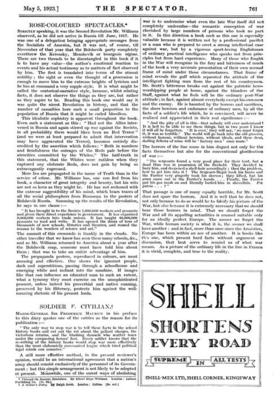ROSE-COLOURED SPECTACLES.*
&warm* speaking, it was the Second Revolution Mr. Williams observed, as he did not arrive in Russia till June, 1917. He was one of a delegation bringing appropriate messages from the Socialists of America, but it was not, of course, till
November of that year that the Bolshevik party completely overthrew the Kerensky, Menshevik or bourgeois regime. There are two threads to be disentangled in this book if it
is to have any value—the author's emotional reaction to events and his actual testimony as to matters of fact observed by him. The first is translated into terms of the utmost nobility ; the sight or even the thought of a procession is enough to move him to the extreme heights of lyricism and he has at command a very supple style. It is what might be called the oratorical-narrative style, because, whilst relating facts, it does not observe the things as they are, but rather as they aspire to be. Reading this book one would say it was quite the nicest Revolution in history, and that the number of casualties bore such a small proportion to the population of Russia that it might be called bloodless.
This idealistic sophistry is apparent throughout the book. Even such a statement as this : "Had not the Allies inter- vened in Russia and again stirred up war against the Soviets, in all probability there would htive been no Red Terror" (and we were at least prepared to admit that intervention may have aggravated the Terror), becomes entirely dis- credited by the assertion which follows : "Both in numbers and fiendishness the outrages of the Reds pale before the atrocities committed by the Whites." The half-truth in this statement, that the Whites were ruthless when they captured any obdurate Reds, does not gain by being so extravagantly expressed.
More lies are propagated in the name of Truth than in the service of crime. Mr. Williams has, one can feel from his book, a character of great integrity and beauty, but his wits are not so keen as they might be. He has not reckoned with the extreme suggestibility of his mind, which bears traces of all the social philosophers from Rousseau to the posters of Bolshevik Russia. Summing up the results of the Revolution, he says in one clause :—
" It has brought in to the Soviets 1,000,000 workers and peasants and given them direct experience in government. It has organized 8,000,000 workers into trade unions. It has taught 40,000,000 peasants to read and write. It has opened the doors of tens of thousands of new schools, libraries and theatres, and roused the masses to the wonders of science and art."
The summit of this crescendo is frankly in the clouds. No other traveller that we know has seen these many schools, &c., and as Mr. Williams returned to America about a year after
the Bolshevik coup, someone must have told him about them ; that was to take an unfair advantage of him.
The propaganda posters, reproduced in colours, are most amusing and effective. One shows the ignorant people, dark and superstitious, passing through a schoolhouse and emerging white and radiant into the sunshine. If images like that can influence an educated man to such an extent, what a tyranny they must exercise on the unsophisticated peasant, unless indeed his proverbial and native cunning, preserved by his illiteracy, protects him against the well- meaning rhetoric of his present lords.














































 Previous page
Previous page